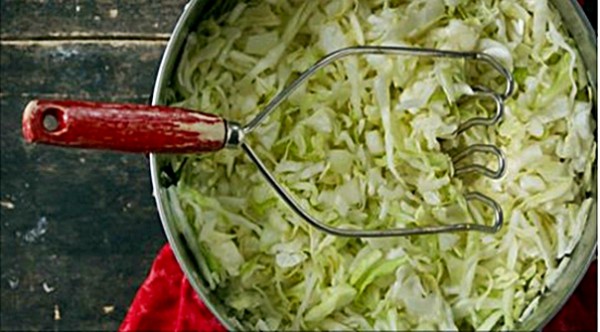I can assume that when you think of sauerkraut, the first thing that comes to your mind is that this ingredient is not a healthy food, right? This is because sauerkraut is usually used on sandwiches and hot dogs to add a little texture to the meal.
Well, we all have heard about the process of fermenting and preserving cabbage. Made from fermented cabbage, sauerkraut is a great source of iron and other beneficial nutrients, and for a long period of time, people have enjoyed this food.
Today, we will tell you more about the health benefits of sauerkraut. Also, we will reveal an easy recipe on how to prepare your own sauerkraut.
The Power of Fermentation
Fermentation is a process used to preserve food. It is usually applied to various foods. During the process of fermentation, natural probiotics are produced. These probiotics are known as extremely beneficial, having the ability to improve the immune and digestive system. To ferment a food, the food should be combined with a bacteria or yeast so the glucose found in the food will be converted into healthy bacteria. Healthy bacteria in the gut are known to be extremely important for proper function of the digestive system, immune system and overall health.
- Probiotics Improve Digestion
One of the main benefits of including more probiotics in your diet is that they can improve digestion. They supply your gut with healthy bacteria which in turn improves the digestive process to destroy the harmful bacteria more successfully. Moreover, these probiotics are essential for our body to be able to absorb nutrients from the food that we are eating.
- Fermented Food Can Boost Your Immune System
Our gut has a responsibility to protect us against illness. So, being a great source of healthy bacteria, adding probiotics to our gut can significantly strengthen the immune system which in turn will control immune cells and prevent autoimmune reactions, including inflammation.
- Improve Brain Function With Probiotics
Our brain is connected to the digestive system. It is a fact that every time we are sick with flu or cold, our head feels fuzzy. So, the vagus nerve is actually the nerve responsible for this connection. This nerve is one of the 12 cranial nerves responsible for transferring information from the intestinal nervous system to the central nervous system located in the brain. Having a healthy amount of good bacteria and limiting the unhealthy bacteria can maintain the proper function of these two systems, which in turn prevents cognitive problems.
- Probiotics Can Help Reduce Stress
Probiotics have also the ability to reduce the stress levels. They have numerous enzymes and digestive substances that can significantly improve cognitive processes and brain function. By having a healthy brain, you will successfully manage stress and deal with it. According to some studies, probiotics help in the production of dopamine and serotonin, essential for regulating the mood.
- Lose Weight by Eating More Sauerkraut
Probiotics can regulate various hormonal functions, which in turn will suppress your appetite and control your food cravings. It is scientifically shown that people with a high intake of probiotics have a lower risk to experience obesity.
- Sauerkraut is Packed with Iron
Besides the probiotics it contains, the fermented cabbage is an excellent source of iron which is essential for brain function, muscle health as well as for preventing anemia, which can result in weakness, headaches, and fatigue.
Homemade sauerkraut recipe
Needed Ingredients:
- 1 medium head of organic green cabbage (you may also use red cabbage)
- 2-3 organic carrots (optional)
- 1½ tablespoons of kosher salt (or Himalayan salt)
- 1 tablespoon of caraway seeds (optional)
- Mason jars with lids
Directions:
It is very important to wash your hands before you start preparing the cabbage. Remove the wilted or limp outer leaves and cut the cabbage into quarters. Trim out the inside core of the cabbage and slice each of the quarters down the length of the cabbage, so you will end up having eight wedges. Then, slice each wedge into thin strips and place the ribbons of cabbage in a large mixing bowl.
You can add carrots if you want some extra color and taste, but make sure to grate them into fine strips and mix them in a large bowl. With your hand combine the cabbage and the salt. You should sprinkle the salt over the top of the cabbage and carrot ribbons. Massage the salt into the veggies and as you do that, it will become watery. This should take 5 or 10 minutes.
Add the caraway seeds at this point if you want to flavor the sauerkraut. Now, you can start placing the cabbage in the mason jars. Use your fist or a food pusher so you can press the cabbage down into the jar. Once you are done, make sure to place a clean cloth over the top of the jar and secure it with a rubber band. This will let air to pass through the jar and prevent debris such as insects and dirt, to enter the jar.
During the next 24 hours, you should press the cabbage down every few hours. Eventually, the liquid should rise over the cabbage, so if needed, add a little extra water. It is recommended to ferment the cabbage for at least 3-10 days. Make sure not to keep the jars in direct sunlight. They should be stored in a cool room. Once you see that fermentation is complete, remove the cloth and replace with a lid.
Making sauerkraut is not a difficult process. However, if the cabbage does not begin to ferment, you should add 1 teaspoon of salt in 1 cup of water in order to help the process.
Source: Healthy Food House
